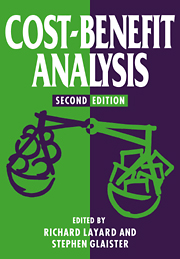Book contents
- Frontmatter
- Contents
- Introduction
- PART I THEORETICAL ISSUES
- PART II HOW TO VALUE THINGS
- PART III CASE STUDIES
- 12 Regulation and deregulation: Enhancing the performance of the deregulated air transportation system
- 13 Pricing: Pricing and congestion: economic principles relevant to pricing roads
- 14 Public transport: The allocation of urban public transport subsidy
- 15 Health care: QALYs and the equity–efficiency tradeoff
- 16 Infrastructure: Water vending activities in developing countries
- 17 The environment: Assessing the social rate of return from investment in temperate zone forestry
- Index
13 - Pricing: Pricing and congestion: economic principles relevant to pricing roads
Published online by Cambridge University Press: 24 November 2009
- Frontmatter
- Contents
- Introduction
- PART I THEORETICAL ISSUES
- PART II HOW TO VALUE THINGS
- PART III CASE STUDIES
- 12 Regulation and deregulation: Enhancing the performance of the deregulated air transportation system
- 13 Pricing: Pricing and congestion: economic principles relevant to pricing roads
- 14 Public transport: The allocation of urban public transport subsidy
- 15 Health care: QALYs and the equity–efficiency tradeoff
- 16 Infrastructure: Water vending activities in developing countries
- 17 The environment: Assessing the social rate of return from investment in temperate zone forestry
- Index
Summary
INTRODUCTION
The road network is a costly and increasingly scarce resource. For the UK the Department of Transport (1989a) calculates that total road expenditures (capital and current) or ‘road costs’ averaged £4.34 billion per year at 1989/90 prices for the period 1987/8–1989/90. Public expenditure on roads has been fairly stable recently, increasing by about 6 per cent in real terms between 1982/3 and 1988/9, but with no strong trend (Department of Transport, 1989b, tables 1.18, 1.22, 1.23). From the 24.6 million vehicles registered, road taxes of £12.7 billion were collected (including the £1.4 billion car tax), or 2.9 times the Department's figures for ‘road costs’. In 1987 15.1 per cent of consumers' expenditure was on transport and vehicles, and 11.3 per cent was on motor vehicles alone. Clearly, road transport is of major economic significance. Car ownership per 1,000 population in the UK appears to be catching up on the rates in the larger European countries and is now about 83 per cent of French and Italian levels, 73 per cent of West German levels. Over the decade 1979–89 the number of private cars increased from 14.3 million to 18.5 million, or by 29 per cent. From 1978–88, the number of total vehicle-km driven rose from 256 billion to 363 billion or by 42 per cent.
- Type
- Chapter
- Information
- Cost-Benefit Analysis , pp. 396 - 417Publisher: Cambridge University PressPrint publication year: 1994



